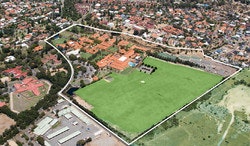Year 12 Italian: Second Language ATAR Course
The Year 12 syllabus is divided into two units (Units 3 and 4) which are delivered as a pair. The notional time for the pair of units is 110 class contact hours.
Unit 3
This unit focuses on Grazie Italia (Thank you Italy). Through the three topics: Cose italiane (All things Italian), La vita italiana (Italian lifestyle) and Il Made in Italy nel mondo (Il Made in Italy around the world), students extend and refine their communication skills in Italian and gain a broader and deeper understanding of the language and culture.
|
LEARNING CONTEXTS
|
TOPICS
|
|
The individual
Students explore aspects of their personal world, aspirations, values, opinions, ideas and relationships with others. They also study topics from the perspectives of other people.
|
Cose italiane (All things Italian)
Students reflect on the place of things Italian in their lives and in their community.
|
|
The Italian-speaking communities
Students explore topics from the perspectives of individuals and groups within those communities, or the communities as a whole, and develop an understanding of how culture and identity are expressed through language.
|
La vita italiana (Italian lifestyle)
Students explore the lifestyle, interests and activities in the everyday life of Italians.
|
|
The changing world
Students explore information and communication technologies and the effects of change and current issues in the global community.
|
Il Made in Italy nel mondo(Il Made in Italy around the world)
Students consider Il Made in Italy as a global brand and explore the contribution of Italians.
|
Unit 4
This unit focuses on Ieri, oggi e domani (Yesterday, today and tomorrow). Through the three topics: Riflettiamo sulla vita e pensiamo al futuro (Reflecting on my life and planning my future), I problemi dei giovani oggi (Youth issues) and I problemi ambientali (Environmental issues), students extend and refine their communication skills in Italian and gain a broader and deeper understanding of the language and culture.
|
LEARNING CONTEXTS
|
TOPICS
|
|
The individual
Students explore aspects of their personal world, aspirations, values, opinions, ideas and relationships with others. They also study topics from the perspectives of other people.
|
Riflettiamo sulla vita e pensiamo al futuro (Reflecting on my life and planning my future)
Students reflect on their final year at school and their plans for the future: further education, employment and travel.
|
|
The Italian-speaking communities
Students explore topics from the perspectives of individuals and groups within those communities, or the communities as a whole, and develop an understanding of how culture and identity are expressed through language.
|
I problemi dei giovani oggi (Youth issues)
Students explore issues faced by Italian youth: health and body image, peer pressure, unemployment and drugs.
|
|
The changing world
Students explore information and communication technologies and the effects of change and current issues in the global community.
|
I problemi ambientali (Environmental issues)
Students consider current issues in the global community in relation to the environment: climate change and pollution.
|
School-based assessment
The Western Australian Certificate of Education (WACE) Manual contains essential information on principles, policies and procedures for school-based assessment that needs to be read in conjunction with this syllabus.
Teachers design school-based assessment tasks to meet the needs of students. The table below provides details of the assessment types for the Italian: Second Language ATAR Year 12 syllabus and the weighting for each assessment type.
Assessment table practical component - Year 12
|
TYPE OF ASSESSMENT
|
WEIGHTING
|
TO SCSA
|
WEIGHTING FOR COMBINED MARK
|
|
Oral communication
Interaction with others to exchange information, ideas, opinions and/or experiences in spoken Italian. This can involve participating in an interview, a conversation and/or a discussion. Typically these tasks are administered under test conditions.
|
50%
|
100%
|
30%
|
|
Practical (oral) examination
Typically conducted at the end of each semester and/or unit and reflecting the examination design brief for this syllabus.
|
50%
|
Assessment table written component - Year 12
|
TYPE OF ASSESSMENT
|
WEIGHTING
|
TO SCSA
|
WEIGHTING FOR COMBINED MARK
|
|
Response: Listening
Comprehension and interpretation of, and response in English to, a range of Italian spoken texts, such as interviews, announcements, conversations and/or discussions. Typically these tasks are administered under test conditions.
|
15%
|
100%
|
70%
|
|
Response: Viewing and reading
Comprehension and interpretation of, and response in English to, a range of Italian print and/or audiovisual texts, such as emails, blog postings, films/television programs (excerpts), letters, reviews and/or articles. Typically these tasks are administered under test conditions.
|
15%
|
|
Written communication
Production of written texts to express information, ideas, opinions and/or experiences in Italian. This can involve responding to a stimulus, such as a blog posting, an email and/or a chart, or writing a text, such as a journal/diary entry, an account, a review, a summary and/or an email. Typically these tasks are administered under test conditions.
|
20%
|
|
Written examination
Typically conducted at the end of each semester and/or unit and reflecting the examination design brief for this syllabus.
|
50%
|
